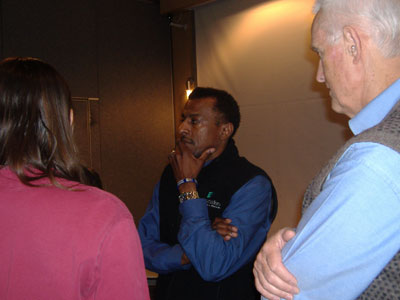With church memberships dwindling in many traditionally Christian countries and with the rise of prominent atheist figures such as Christopher Hitchens and Richard Dawkins, it seems odd to declare the dawning of a new “Age of the Spirit in the 21st Century,” as did Wednesday night as part of CSM’s Hennebach Lecture series.
Currently a professor of African-American Studies at Metro State, Hudson grew up in a Baptist household. Hudson was baptised at the age of 15 after becoming intrigued by the teachings of Jesus, and deciding to “follow that person’s model” for his life. After graduating from the Air Force Academy and serving for several years at a base in Oklahoma, Hudson became disillusioned with the Anglican and Evangelical churches he encountered, as well as mainline Protestantism in general. He points to their focus on creeds, beliefs, and schedules as unsatisfying. Instead he turned to the charismatic, or pentecostal, movement, with its focus on the Holy Spirit and willingness to “wait until the Spirit comes.” Hudson claims that this movement, founded in the early 20th century, is fast displacing traditional Christianity, especially in a post-modern world where “people want meaning in their lives,” rather than a set of beliefs or rituals.
Hudson divides the history of Christianity into three distinct eras: the Age of Faith, from 30 to 300 AD; the Age of Belief, from 300 to 1900 AD; and the Age of the Spirit, from 1900 AD to the present. This dichotomy between faith and belief may not be immediately obvious, especially when the words are often used interchangeably, even by the religious. Hudson defines faith as a deep-seated conviction or “ultimate concern,” while he regards belief as a more transitory opinion with some degree of uncertainty. As canon and orthodoxy became established during the fourth century AD, argues Hudson, beliefs and creeds became like “orientation programs for new recruits,” gradually “replacing faith in Jesus with beliefs about him.”
The “Age of the Spirit,” predicts Hudson, will be marked by the slow death of fundamentalism and its “nostalgia for the mythical, unrealistic past,” along with traditional, hierarchical churches and religious institutions based upon dogma and creeds. Rather than being totally displaced by scientific rationalism and atheism, Hudson believes in a resurgence of fast-growing, non-canonical, decentralized, discipleship-based, and Holy Spirit-embracing churches.
Although such a movement is by its nature difficult to quantify and measure, Hudson claims that “Christianity is actually growing faster than it ever has before,” and projects global growth of church numbers in the hundreds of millions for the next 40 years. This growth of a new style of Christianity seems to eschew the traditionally Christian areas of Europe and is instead most evident in the “developing” countries of Africa, Asian, and Latin America.
Whether such a prediction comes true, it can be said that many around the world are trading traditional religions for mysticism, or declaring, “I am not religious, but I am spiritual.” This movement tends to focus on the sayings of spiritually-minded celebrities rather than the writings of saints or theologians. While Hudson advocates for the separation of church and state, at least in the institutional and legal sense, he also senses a yearning for individuals to find “the sacred in the secular,” and to integrate the two arenas in their own lives.
Hudson is optimistic for the future role of religion and religious leaders in the public sphere, as well as their ability to achieve humanitarian progress. Ultimately, opines Hudson, religion is simply a tool “to find meaning on this side.” He points to past successes such as the Truth and Reconciliation Committee of post-apartheid South Africa as models for the future and encourages religious people to become socially and civically literate.


